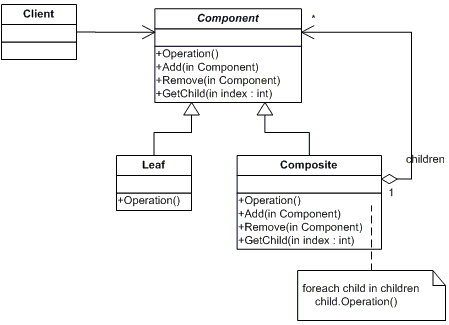组合模式(Composite Pattern)
组合模式,有时候又叫部分-整体结构(part-whole hierarchy),使得用户对单个对象和对一组对象的使用具有一致性。简单来说,就是可以像使用一个对象那样,来使用一组对象(The composite pattern describes that a group of objects are to be treated in the same way as a single instance of an object.),最后达到用户和这一组对象的解耦。请看下图:

Component,就是对Leaf和Composite的抽象,是Leaf和Composite必须实现的接口(或者抽象类)
这单个对象,就是Composite,提供操作Leaf的方法和实现所用Component的方法。
这一组对象,就是Leaf。
例子如下:
/** Component **/ interface Graphic { //Prints the graphic public void print(); } /** Leaf **/ public class CircleLeaf implements Graphic { public void print() { System.out.println("Circle..."); } } /** Leaf **/ public class RectangleLeaf implements Graphic{ public void print() { System.out.println("Rectangle..."); } }
/** Composite **/ public class GraphicComposite implements Graphic{ private List<Graphic> childGraphics = new ArrayList<Graphic>(); public void print() { //key method. Loop and call Leaf method. for(Graphic g : childGraphics){ g.print(); } } // manipulate Leaf public void add(Graphic g){ childGraphics.add(g); } public void remove(Graphic g){ childGraphics.remove(g); } }
这样,客户端就不需要操作每一个Leaf,直接通过GraphicComposite可以操作所有的Leaf:
public class ClientSide { public static void main(String[] args) { GraphicComposite graphic = new GraphicComposite(); graphic.add(new CircleLeaf()); graphic.add(new RectangleLeaf()); graphic.print(); } }
最后,最开始看到的这个模式的使用,是在我参加的一个开源项目里。当时候觉得设计得不错,没想到是Composite模式。之后,自己也在项目中使用过,特此写下此贴来总结一下。
参考:
http://en.wikipedia.org/wiki/Composite_pattern
http://www.cnblogs.com/peida/archive/2008/09/09/1284686.html